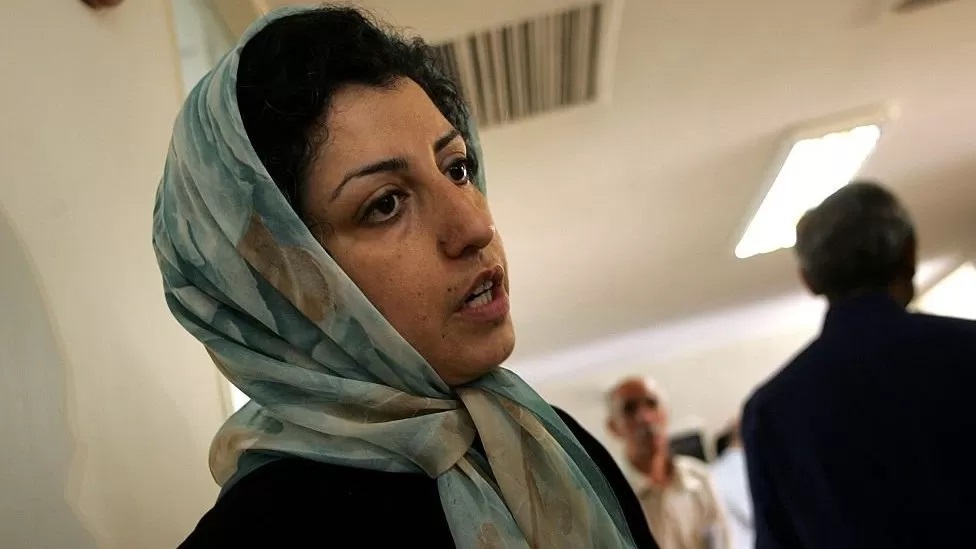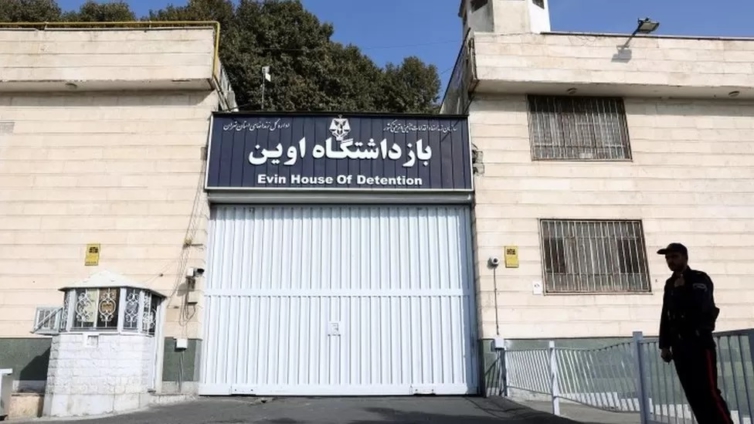
Audio By Carbonatix
A leading human rights activist in Iran has written from prison to give the BBC details of how women detained in recent anti-government protests are being sexually and physically abused.
Narges Mohammadi said such assaults had become more common in recent protests.
She is serving a lengthy sentence in Tehran's notorious Evin prison.
The protests were triggered by the death in custody in September of 22-year-old Mahsa Amini, arrested for violating strict dress codes.
She was detained by morality police in mid-September for allegedly wearing her hijab, or headscarf, "improperly".
More than 500 protesters, including 69 children, have been killed, while thousands of others have been arrested, human rights activists say. Dozens of Iranian security personnel are also reported to have been killed.
Many of those arrested have allegedly been subjected to torture and other ill-treatment in custody.
Ms Mohammadi is deputy head of Nobel laureate Shirin Ebadi's Defenders of Human Rights Center. She has received several jail sentences since 2011 and is currently in prison for "spreading propaganda".
This year she was also included in the BBC's 100 Women - a high profile list of 100 inspiring and influential women from around the world.
Prominent political prisoners in Iran like Ms Mohammadi, who are not in solitary confinement, are often able to communicate with the outside world via their families or fellow activists.
'Hands and legs tied to hook'
Ms Mohammadi says in her letter that some of the women arrested during the recent demonstrations were transferred to the women's ward in Evin prison.
That gave her a chance to hear shocking details of the abuse they suffered.
She says that one well-known activist had her hands and legs tied to a hook above her head in the vehicle taking her to prison - and was then sexually assaulted by security officers.

Ms Mohammadi says she saw bruises and scars on her body.
She says another woman who was arrested in the street was taken on a motorbike by two security officers - one in front and one behind - and was repeatedly assaulted.
Iran's state broadcaster has denied reports of security forces using rape and sexual abuse against female protesters.
A report on 19 December said female prisoners were kept in facilities run by all-female staff, adding that claims of rape in the Western media were "rumours" and "baseless".
But Iran also continues to heavily repress domestic reporting of the protests, with one recent report suggesting it was now the third largest jailer of journalists in the world.
Ms Mohammadi says that even though reporting abuse may lead to intimidation of the families of women in detention, she believes it's necessary to expose what's happening - in order to try to put a stop to it.
"Not revealing these crimes would contribute to the continuation of application of this repressive methods against women," she says.
"Therefore, it seems that the assault on women activists, fighters, and protesters in Iran should be widely and powerfully reported at the global level."
She added that this was especially important given the pressure on civil society in Iran.
"In the absence of powerful independent civil organisations, the attention and support of the media and international human rights organisations and global public opinion is essential," she said.
Ms Mohammadi ended the letter by expressing the belief that Iran's "brave, resilient, lively and hopeful women" would attain victory.
"Victory means establishing democracy, peace and human rights and ending tyranny," she added.
"We will not back down."
Latest Stories
-
Some OMCs reduce fuel prices; petrol going for GH¢10.86, diesel GH¢11.96
31 minutes -
Trump says health is ‘perfect’ amid ageing concerns
54 minutes -
China’s BYD set to overtake Tesla as world’s top EV seller
57 minutes -
Joy FM’s iconic 90’s Jam returns tonight: Bigger, better, and packed with nostalgia
2 hours -
Uproar as UG fees skyrocket by over 25% for 2025/2026 academic year
3 hours -
Japan PM joins fight for more female toilets in parliament
4 hours -
Ga Mantse declares war on fishing industry child labour
4 hours -
Adom FM’s ‘Strictly Highlife’ lights up La Palm with rhythm and nostalgia in unforgettable experience
5 hours -
OMCs slash fuel prices as cedi gains
6 hours -
Around 40 dead in Swiss ski resort bar fire, police say
7 hours -
AFCON 2025: Aubameyang and Nsue make history among oldest goalscorers
8 hours -
AFCON 2025: How Kwesi Appiah’s Sudan qualified for round of 16 without scoring any goal
9 hours -
Ghana is rising again – Mahama declares
9 hours -
Firefighters subdue blaze at Accra’s Tudu, officials warn of busy fire season ahead
10 hours -
Luv FM’s Family Party In The Park ends in grand style at Rattray park
10 hours

